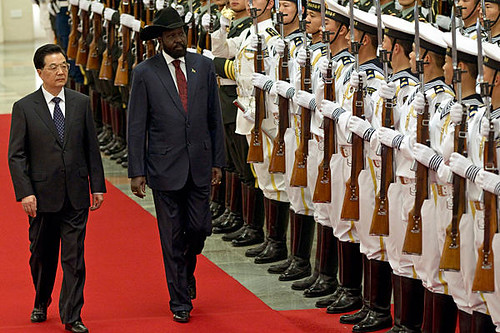
People's Republic of China President Hu Jintao with President of South Sudan Silva Kiir walk past honor guard in Beijing during official visit. Kiir cut short his visit to China amid growing threats of war with Sudan., a photo by Pan-African News Wire File Photos on Flickr.
One year on, South Sudan's liberation incomplete: Kiir
Mon, Jul 9 2012
By Hereward Holland
JUBA (Reuters) - South Sudan's President Salva Kiir vowed on Monday to confront the corruption plaguing his country a year after it declared independence and said the new nation's economy still had to be "liberated" from its dependence on foreign powers.
Wearing his signature black fedora, Kiir addressed an assembly of dignitaries and a cheering crowd to mark the nation's first independence day after splitting from Sudan under a 2005 peace deal that ended decades of civil war.
Two helicopters bearing the country's red, green and black flags flew over the crowd of thousands gathered in the scorching sun to attend the ceremonies. Tanks, rocket launchers and infantry paraded past.
Many South Sudanese hoped the country's emergence as the world's newest nation would begin an era of prosperity, but the country has remained mired in disputes with its northern neighbor over oil, the border and a many other issues.
The landlocked South shut off its oil production in January, instantly erasing 98 percent of state revenues, as part of a dispute with Sudan over how much it should pay to export crude using pipelines and other infrastructure in the north.
In his speech, Kiir sought to portray the country's economy as part of the country's broader "liberation" struggle.
"We still depend on others. Our liberty today is incomplete. We must be more than liberated. We have to be independent economically," he told the crowd.
Discontent has been rising over the oil shutdown, which piled hardships on people already weary from years of conflict.
While many South Sudanese are still basking in the pride of their hard-won political freedom, they are starting to ask when they will enjoy the material benefits of independence.
Prices have been soaring, forcing many people to tighten their belts while corruption has gone largely unchecked.
"Now we are struggling for even the basic needs," one government employee said as she sat in a traffic jam, cursing at the luxury cars creeping along newly-tarmacked streets.
"We've given the government a lot of responsibility, allowed them to take decisions on our behalf but they don't make any consultations. They shut down the oil without telling us anything and they didn't even have a plan B."
WOUNDED LION
South Sudanese voted overwhelmingly to secede in a referendum last year that was promised in a peace deal that ended more than two decades of war over ideology, religion, ethnicity and oil. Some 2 million people died in the conflict.
Amid pomp and flag-waving, the former guerrillas of the Sudan People's Liberation Movement took full control of the country on July 9, 2011.
They also took about three-quarters of Sudan's oil output, bringing in billions of dollars that many citizens hoped would be channeled to develop a nation where just over a quarter of adults can read and life expectancy is under 50.
Instead, officials are now scrambling to find enough money to keep basic services running.
Businessman Tong Albino Akot said the government's new interest in collecting taxes was a positive step, but his agriculture and import venture was feeling the sting.
"The government tried to explain that there's no money. They're even getting tough on income tax. They're like a wounded lion opening its mouth. You can feel it," Akot said.
Corruption and mismanagement have not helped. In June, Kiir sent a letter to current and former officials asking them to return $4 billion of "stolen" government money.
On Monday, Kiir vowed to end such abuses. "This government will not tolerate what is called corruption," he said.
The country would also trim its government and was working on developing alternatives to oil revenues, including tax collection and "alternative oil infrastructure," he said.
South Sudan had started work on a small refinery in its Upper Nile state, he said. "These will solve some of our problems although it will not solve all our problems."
FLOWER OF FREEDOM
Independence has also failed to end violence both inside the country and on the border with Sudan. In April, South Sudan's army occupied an oil-producing region also claimed by Sudan, bringing the countries close to a new war.
A few months earlier, the armed forces failed to prevent cattle raids between warring ethnic groups that killed hundreds of people.
Human rights groups say weak rule of law allows security forces to carry out abuses against civilians with impunity.
The challenges have not dampened everyone's optimism. Leaning back on a plastic garden chair in an unfinished building near Juba airport, student Pater Achuil sipped a glass of milk and listed the ways life had improved since secession.
"We have waited for the flower of freedom," he said, shards of concrete poking through the capital's skyline behind him. "The difference you can feel here in South Sudan is that ... even the government cannot hassle you (now)."
But moments later, police in blue camouflage brandishing Kalashnikov rifles raided the tea stall, confiscated the shisha water pipes and loaded the chairs onto a truck.
Achuil stood with his friend to the side, baffled. The officer brushed off a question about whether the raid was part of a drive to clean up Juba ahead of celebrations.
"This is not your concern," he said.
(Writing by Alexander Dziadosz; Editing by Robin Pomeroy)
No comments:
Post a Comment